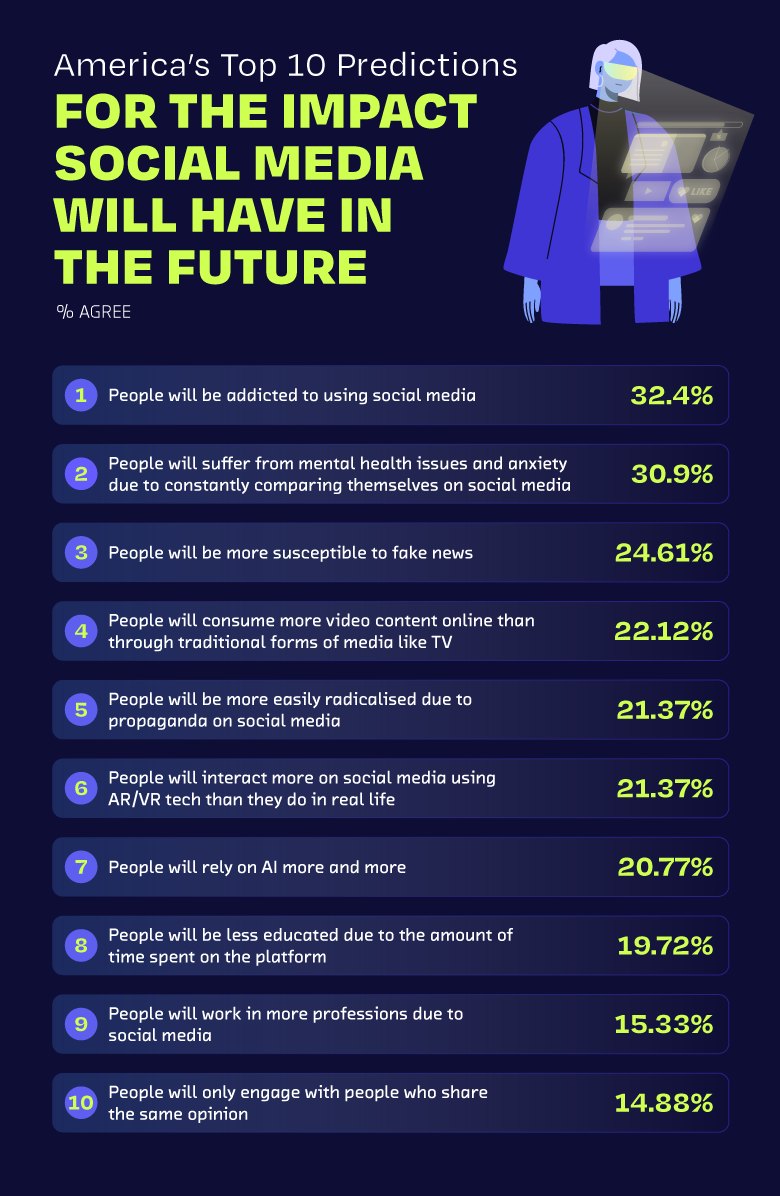Impact of technology and social media on mental health: Here are the top 10 predictions for the future

In just two decades, social media has had a profound effect on society. From Facebook to TikTok, these platforms have completely revolutionized the way we communicate, consume information, and interact with one another.
But while there are many benefits to social media, such as connecting people across the globe and providing a platform for social activism, it’s also important to acknowledge the new challenges it has brought about. One of the most significant impacts of social media is that it has made communication faster and more efficient than ever before. No matter where you are in the world, you can connect with someone instantly and share your thoughts, ideas, and experiences with them in real time.
However, we can’t ignore the negative effects of social media, such as the spread of fake news and misinformation, which can lead to political polarization and a breakdown of trust in institutions. Social media has also been linked to mental health issues like anxiety and depression, as well as cyberbullying and addiction.
Back in 2021, we wrote about the Father of virtual reality (VR) Jaron Lanier after he warned that social media is dopamine that reprograms your brain. Lanier went on to say that excessive use of social platforms can be harmful when it becomes an addiction.
But Lanier is not alone. A new survey conducted by HigherVisibility to assess the current attitudes toward social media in the US revealed some shocking findings about the impact of social media on mental health. HigherVisibility surveyed 2,000 consumers about the effect they feel the growth of social media has and will have, on their lives.
Here’s what the data reveals:
- Almost 1 in 3 people (32.4%) believe that people will be addicted to using social media
- Over a quarter (30.9%) believe that people will suffer from mental health issues and anxiety due to constantly comparing themselves on social media
- Almost a quarter of people (24.61%) believe people will be more susceptible to fake news
- Over 1 in 5 people (21.37%) believe that people will interact more on social media using AR/VR tech than they do in real life
- Nearly 1 in 5 people (19.72%) believe people will be less educated due to the amount of time spent online
America’s Top 10 Predictions for the Impact Social Media Will Have in the Future
As part of the survey, HigherVisibility asked respondents, ‘if people continue using this platform (the one where they spend the most time) to the same extent or more, in 50 to 100 years I expect that people will be the following…’
HigherVisibility conducted a survey to find out what people think the future holds for the platform where they spend most of their time. The results revealed that over 20% of respondents believe that video content consumption online will surpass traditional media in the next 50 to 100 years. This prediction is already being proven right as data from the US shows that citizens are spending more time on digital media than traditional media.
However, this shift in media consumption habits raises concerns about the impact of spending so much time online. Nearly a quarter of respondents believe that people will be more vulnerable to fake news, which spreads rapidly on social media. Another 20% think that people will become more easily radicalized due to propaganda on these platforms.
The rise of AI technology has been compared to the impact of social media, with concerns about the lack of legislation to protect consumers’ rights and privacy. There’s no doubt that AI has the potential for great advancements, but there’s also the possibility of misuse.
Interestingly, US citizens fear the impact of AI and AR/VR technology on people who spend time online. “1 in 5 people believe that we will rely on AI more and more, and a similar number fear that people will interact more on social media using AR/VR tech than they do in real life.”
Some respondents believe that we will rely on AI more and interact more through AR/VR technology than in real life. This raises the question of whether social media is bringing us closer together or driving us apart.
The results of this survey suggest that the lifestyle presented in “The Social Dilemma” may not be as far-fetched as we thought. With issues of misinformation and fake news, it’s important to take a critical look at how we use social media and what impact it may have on our society in the future.
Methodology
The research was conducted by Censuswide with 2,000 US consumers (nat rep) aged 16+ in February 2023. Censuswide abides by and employs members of the Market Research Society which are based on the ESOMAR principles.
You can read the full report here.





